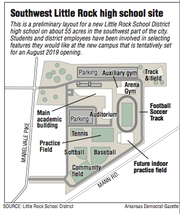Little Rock School District leaders are in the midst of planning the construction of a new high school.
A campus for as many as 2,250 ninth- through 12th-graders is on the drawing board for a 55-acre, district-owned site between Mabelvale Pike and Mann Road, a location most easily described as being behind the Home Depot and Wal-Mart stores in southwest Little Rock.
The planning to date has included bringing in the Polk Stanley Wilcox architecture firm to design a campus that not only complies with state requirements but also incorporates what students, teachers, district specialists and community members envision for a successful school to replace both McClellan and Fair high schools.
Both McClellan High, which opened in 1965, and Fair High, which opened in 1982, were constructed by the neighboring Pulaski County Special School District and annexed by the Little Rock district in 1987 as a result of a federal court desegregation order.
Parkview High on John Barrow Road is the last high school the Little Rock district built, and it opened nearly 50 years ago.
In constructing a new high school, the Little Rock district will join the ranks of districts in central Arkansas and around the state that have built or extensively remodeled high schools in recent years.
North Little Rock opened a largely new high school in 2015. Pulaski County Special opened Maumelle High a few years ago and is now building a new Mills High. The new Jacksonville/North Pulaski district is in the midst of building a replacement for Jacksonville High. The Bryant and Conway districts have relatively new high schools, as do Fayetteville, Springdale, Rogers and Bentonville districts in Northwest Arkansas.
"We've been dreaming, but we are close now to right-sizing a facility that will accommodate our dreams," said Little Rock Deputy Superintendent Marvin Burton, who is the Little Rock district's point man for the McClellan and Fair replacement. "This is very purposefully done to address the needs for these two schools."
[EMAIL UPDATES: Sign up for free breaking news alerts, daily newsletters with top headlines]
Students from McClellan and Fair, as well as from Mabelvale and Cloverdale middle schools, have weighed in on the features they would like in the new high school, Burton said. District specialists in curricula, special education, library/media, technology, health services, food services, and maintenance have also identified critical and desirable features in part through the use of "gallery walks."
Participants in those "walks" view displays of building features -- be it an assortment of school libraries, cafeterias or athletic facilities -- and tagging each as either desirable or not appropriate. Officials expect the school to be three stories and approach $90 million to build.
The gallery walk exercise will be repeated in the coming weeks with employees at the southwest Little Rock schools, parents of students in those schools and with members of community organizations, Burton said. And all the results will be used by the architects as decisions about the spaces are made.
While the design work is not at all complete, there are popular features that are rising to the top, Burton said. Those include ample natural daylight in classrooms -- which is missing in the classrooms at both Fair and McClellan. Also preferred are lots of technology and spaces to use technology; good security; low-maintenance and durable building materials; collaborative work spaces for students; room for hands-on, project-based learning; real-world simulated work space; indoor and outdoor seating; and food-themed cafeteria lines.
Planners want the new campus to be user-friendly to the general public, too, Burton said. Ideally, he said, the school's auditorium should be able to accommodate plays and concerts for the community, and the athletic facilities should be such that the school and district can host state tournaments.
Cathy Koehler, president of the Little Rock Education Association employee union and an elementary school library media specialist, has participated in some of the planning sessions. She said the campus is going to be "stupendous," "state of the art" and a benefit to the city.
"When students see the plans for the high school and see it go up, they will have concrete proof that this community values them and wants them to be successful," Koehler said.
"It's a dream come true for a school librarian," she added. "What they are talking about in terms of the academic spaces, the communal spaces, the sports -- it's on a level that we have never seen in this city. It's going to be a masterpiece, and I can't think of students who deserve it more."
The Little Rock district has operated under state control and without a locally elected school board since January 2015 because six of its schools -- including McClellan and Fair high schools and Cloverdale Middle School -- were labeled at the time by the state as academically distressed. Baseline Elementary has since been removed from that list.
The desire for a new high school in southwest Little Rock predates the state takeover. The Little Rock School Board voted to purchase the land for a replacement school for McClellan in April 2013.
Superintendent Mike Poore said last week that he wasn't in the district at the time but "I want to be the guy that fulfills that promise."
Poore acknowledged that eSTEM Public Charter Schools is building a high school on the campus of the University of Arkansas at Little Rock, about 6 miles from the planned southwest campus. The Little Rock district and independently operated public charter schools such as eSTEM compete for the same students and state education dollars.
"I have heard some people say that if eSTEM is going to build a campus, why would we build a new high school? It's because our kids deserve a great campus," Poore said. "They deserve a place where they are going to have opportunities for career programs. Our kids deserve to have hallways that are closed [to the outdoors] and our kids deserve to have windows in their classrooms. That doesn't exist right now at McClellan and in some cases not at Fair."
Poore spearheaded the construction of the new Bentonville West High School when he was superintendent for five years prior to this year.
"I'm extremely proud of Bentonville West and the good work we did together up there, but I tell you this is going to be as exciting or even a little bit more exciting because it has been a community need for such a long time," he said.
Burton said that if the new high school is going to open in August 2019, the site work will need to begin as soon as this coming May. That hinges in part on funding.
Since October, Poore has talked about the possibility of asking Little Rock School District voters in the spring to approve a 14-year extension of 12.4 property tax mills for schools that are already part of the tax rate but are due to expire in 2033. The extended tax would finance a $160 million bond issue. The bond money would be used for the new high school and other construction needs in the state's largest district.
Extending the mills would not result in an increase in property owners' property tax bills, Poore said. But the extension would result in taxpayers continuing to pay the same rate as now for more years.
There are differing viewpoints on the possible millage extension -- no special election has yet been scheduled -- even among community members who would like to see the construction of a new high school in the district.
Jim Ross, a member of the Little Rock School Board at the time it was dissolved by the state, on Friday questioned whether an increased debt load because of a new bond issue will jeopardize the Little Rock district's financial solvency and its efforts to regain local school board control.
As it is, Poore has proposed closing as many as three elementary schools, a pre-kindergarten center and an alternative school in the coming 2017-18 school year -- as well as trimming secondary school staffing -- to cut more than $10 million in expenses. That is to adjust to the loss of state desegregation aid, which is to end after the 2017-18 school year.
Ross said he and others who have fought against the state takeover of the Little Rock district will oppose an election and a millage extension if further analysis of district finances bears out the solvency concerns.
"Our position is going to be that this is an attempt to bankrupt the district and keep it under state control until they finalize the charter school issues," Ross said. "We'll fight them tooth and nail over any attempts to refinance bonds if the numbers are right."
Gary Newton, executive director of Arkansas Learns, a parental school-choice advocacy organization, said the district should adhere to promises made to build the new high school without making the project contingent on the extension of the property tax mills.
"To me, the refinancing should absolutely be used for the high school, but even if the refinancing doesn't occur, the southwest high school was promised and should be built. It may be a heavier lift without the refinancing, but it still should happen," he said. "The refinancing would empower the district to rebuild and refurbish facilities in every zone of the district."
Newton said the Little Rock district has historically diverted some of the money generated by mills approved by voters for construction, or capital needs, to the operating budget that is used to pay salaries and utility bills. He suggested that the money raised by debt service mills should be used as intended by voters.
"What is disconcerting is to hear a lot of folks -- who I say are on the fringe -- say, 'We won't support something that does not raise taxes and does maximize taxpayer dollars because we don't like who is in charge,'" Newton said.
"No one denies there is an enormous need out there. ... It's really odd to see those who are already opposing this because they simply don't want the district to succeed while it is in state takeover."
A Section on 12/29/2016





